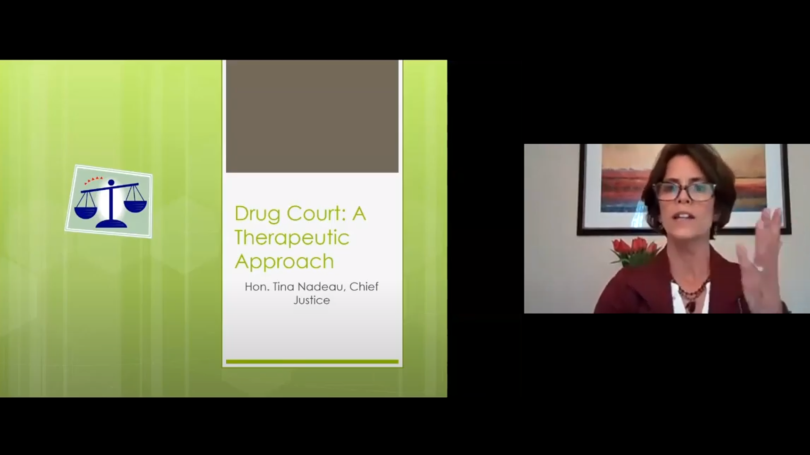
- Public Policy
- Leadership
- Funding
- News & Events
- About the Center
Back to Top Nav
Back to Top Nav
Back to Top Nav
Back to Top Nav
On May 12, 2021, Tina Nadeau, Chief Justice of the New Hampshire Superior Court joined the Rockefeller Center to deliver the 2021 Perkins Bass Distinguished Lecture. The discussion was moderated by Senior Fellow and the Associate Director for Curricular and Research Programs, Professor Ronald G. Shaiko.
Chief Justice Nadeau is board member of the New England Association of Drug Court Professionals, and New Futures, a nonprofit organization that works to reduce substance use disorder. She is also a faculty member of the National Association of Drug Court Professionals. The subject of her lecture was “Drug Court: Where Justice Meets Treatment”.
Nadeau is a long-time advocate for the use of drug and mental health courts. She argues that for many they are a more effective mechanism for rehabilitation than entrance into the traditional carceral system.
She began her talk by talking about her own personal awakening to the ineffectiveness of incarcerating repeat non-violent drug offenders. She offered an anecdote of a woman who had been a serial offender of drug crimes. “I have seen this person now going on their fourth time with increased jail time”, she told a prosecutor. “Now, you’re recommending that she be sent to state prison. What is it about jail that you think is working? Because it’s not.”
Chief Justice Nadeau recognizes the need for incarcerating “dangerous”, violent offenders whether or not their crime involved drug possession or misuse; however, incarceration rarely targets the underlying problem that leads to criminality. She explained that “80% of offenders use drugs or alcohol” and “nearly 50% of jail and prison inmates are clinically addicted” to these substances.
“Most of the folks we see are struggling with substance use disorder. They are committing new crimes after their release from jail or prison, because jail or prison doesn’t address the underlying problem that forms the basis for their crime.” According to Nadeau, “60-80% of offenders using drugs commit a new crime after release”.
Drug courts have a 69% success rate, compared with just 25% success through traditional incarceration. Another major boon for the use of drug courts is that, according to the chief justice, they are more economical. Drug courts cost around $12,000 per year for each offender, while traditional incarceration carries a $40,000 yearly price tag for each prisoner.
“If jail or prisons changed behavior, they would be empty and they are not”, asserted Nadeau. With more than 20 years of empirical backing, the chief justice believes that drug courts are a more effective method of rehabilitation for repeat, non-violent drug offenders than traditional practices.
Those eligible for drug court are typically repeat offenders who began using drugs from an early age and who are heading to state prison because the underlying problem of addiction has not been addressed. These candidates are identified as “high-risk, high-need” and they plead guilty to a crime related to their substance use disorder and they receive a fully suspended state prison sentence. This sentence is a three-year probation, during which they spend the first year and a half attending drug court.
Drug court is a rigorous process. “Once they enter their plea”, explained Chief Justice Nadeau, “[they are required] to appear in court weekly to have a conversation with a judge about how they’re doing. They are in group treatment three hours a day, three days a week.” Participants also get weekly individual treatment and case management services and attend support meetings like AA or NA at least once a week. They are randomly drugtested twice a week. A team of judges, case managers, and social workers involved in the drug court problem meet once a week to discuss the progress of each participant.
She explained that it is critically important that participants are high-risk offenders or else the program can have adverse effects, but for the targeted population, successfully navigating the drug court system can have a lifelong positive impact.
Written by Blake McGill ’22, Rockefeller Center Student Assistant for Public Programs